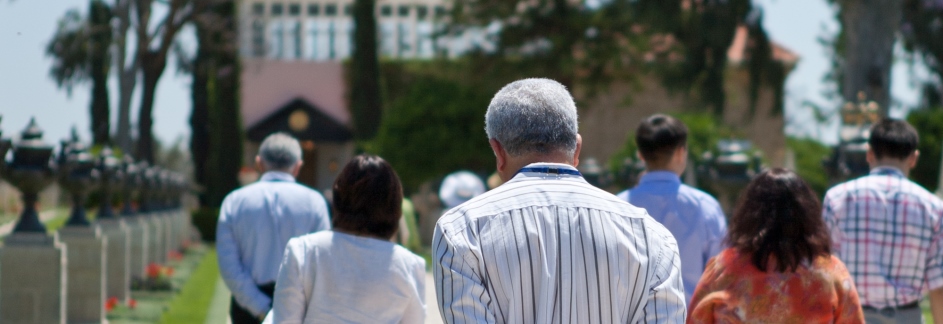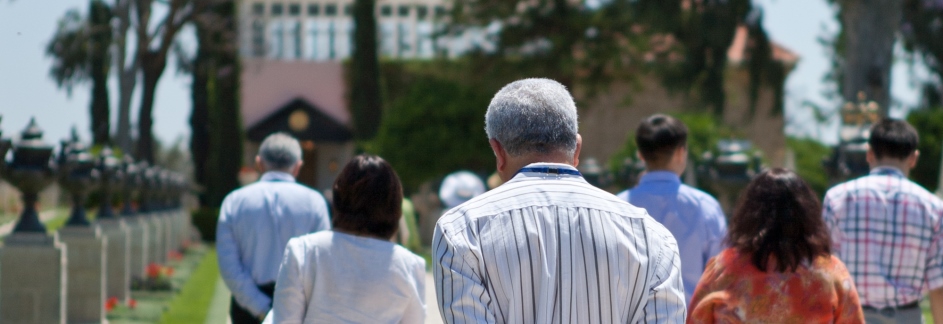The views expressed in our content reflect individual perspectives and do not represent the authoritative views of the Baha'i Faith.
 Erica Toussaint-Brock recently attended the Eleventh Baha’i International Convention in Haifa, Israel as a delegate from the United States. Every five years the nine elected members of each Baha’i National Spiritual Assembly serve as the delegates who then elect their International governing body, the Universal House of Justice. This election, unique in the world, allows delegates from every nation to cast their ballots for this global democratic governing body, and to offer their observations about the development of the Baha’i communities in their countries.
Erica Toussaint-Brock recently attended the Eleventh Baha’i International Convention in Haifa, Israel as a delegate from the United States. Every five years the nine elected members of each Baha’i National Spiritual Assembly serve as the delegates who then elect their International governing body, the Universal House of Justice. This election, unique in the world, allows delegates from every nation to cast their ballots for this global democratic governing body, and to offer their observations about the development of the Baha’i communities in their countries.
 A hush falls over the massive auditorium filled with delegates from every country in the world. Expectant eyes gaze on a beautiful stage, which resembles the gardens and buildings of Baha’i world center; massive fluted columns, tall green trees and flowered borders evoke the feeling of walking in the gardens surrounding the buildings which form the spiritual and administrative heart of the Baha’i world.
A hush falls over the massive auditorium filled with delegates from every country in the world. Expectant eyes gaze on a beautiful stage, which resembles the gardens and buildings of Baha’i world center; massive fluted columns, tall green trees and flowered borders evoke the feeling of walking in the gardens surrounding the buildings which form the spiritual and administrative heart of the Baha’i world.
Quietly a woman walks to the podium to welcome members of the national administrative bodies of the Baha’i Faith, from countries ranging from the United States to the small island nation of Trinidad and Tobago, to the eleventh International Baha’i Convention. We have come to elect the Baha’i world’s international governing body, the Universal House of Justice, and to share our understanding of the growth and development of the Baha’i teachings worldwide.
More than a thousand delegates arrived in Israel four days earlier, and they have spent the last few days visiting the Baha’i holy places in the environs of Haifa and Acco, spiritually preparing themselves to carry out their sacred obligation to vote and to consult in this unique international forum.
The contrast between this gathering and any other political conclave is stunning. No one discusses the election; no one mentions names to be considered; no one offers themselves for consideration. Instead, they delight in the convocation of the nations and marvel at the diversity of the family of man, embracing one another, eagerly sharing and learning from one another. Their happy gathering resembles a world-wide reunion. Individuals from every country pray quietly together and talk animatedly in the halls and on the busses, making no distinction between themselves – whether from the powerful countries of the world or the least “developed”.
During these pre-convention visits you might see a delegate from the UK listening intently to a delegate from the Congo, a delegate from India sharing with delegates from countries in South America, a US delegate eagerly listening to delegates from Mongolia. Conspicuously absent are the current members of the Universal House of Justice – there is no electioneering of any kind, no matter how subtle. A feeling of holiness and joy pervades this more than 2,000 strong gathering.
 When the election process begins, delegates seat themselves alphabetically by country in the massive convention hall in Haifa. A short round of prayers begins, and the Chief tellers take their place on stage. After reviewing a few simple instructions, the voting begins. The tellers walk to a wooden ballot box and unlock it, open the lid and display its empty interior to the gathered delegates. As a teller places the ballot box back on its stand, an expectant hush pervades the hall.
When the election process begins, delegates seat themselves alphabetically by country in the massive convention hall in Haifa. A short round of prayers begins, and the Chief tellers take their place on stage. After reviewing a few simple instructions, the voting begins. The tellers walk to a wooden ballot box and unlock it, open the lid and display its empty interior to the gathered delegates. As a teller places the ballot box back on its stand, an expectant hush pervades the hall.
For the next half an hour the delegates silently fill out their blank ballots. After reflection, each delegate writes the names of the nine people each heart is moved to choose. Heads lift as the delegates gradually finish voting. Finally the chief teller asks if anyone needs more time. Everyone has finished.
She then proceeds to read, country by country, the name of each delegate in order, and a procession of voters, many resplendent in their native dress, proceeds reverently across the stage, depositing each ballot in the box. Many, as they look up after placing their ballot, gently nod or bow in respect for the election. Some come from countries where no elections of any kind take place. The absent delegates, from countries affected by the political divisions of the world, cannot leave their countries – or cannot enter Israel. Their ballots arrive by mail. The procession of voters, country by country, continues for three hours. When the last delegate from Zimbabwe has voted, the hall erupts in joyous applause. The tellers seal the ballot box, and a procession of tellers from countries around the world carries it out of the hall. The election has been held in a sacred, unified atmosphere. Results will be announced the next day.
Throughout the following days delegates consult on the most pressing topics facing the Baha’i world. They have prepared themselves by reading in advance a lengthy document detailing the frontiers of learning in the Baha’i world. They discuss worldwide programs designed to bring a practical application of this statement in the Baha’i Writings,
“The betterment of the world can be accomplished through pure and goodly deeds, through commendable and seemly conduct.”
A delegate from the Congo shares what they have learned while fostering programs for children and junior youth in their cities and villages. These community-building developments around the world yield palpable results, in neighborhood after neighborhood, village after village, as Baha’is carry out programs of spiritual enrichment with local groups of young people. Stories abound of lives changed, communities enhanced, an attitude of service developed in the children, junior youth and youth around the world. Everyone eagerly listens to each other, informed by a humble attitude of learning. No one claims final knowledge, but everyone has something to share which will benefit the others.
On the second day of the convention the chief teller announces the results of the election. As she reads the names of the new members of the Universal House of Justice, each of the nine elected individuals walks to the stage and stands, head bowed by the weighty responsibility. As the ninth member reaches the stage the entire auditorium rises as one accord in prolonged, joyous applause, then breaks into song.
Hearts overflow in spiritual joy that the sacred voting process has been completed. As the delegates flow out of the auditorium their comments to each other reflect the awe they feel at an election like this — free of partisanship, unified, sacred and joyous. No, this is not a utopian ideal — for the Baha’is this is the grounded reality of their lives.
















Comments
Sign in or create an account
Continue with Googleor